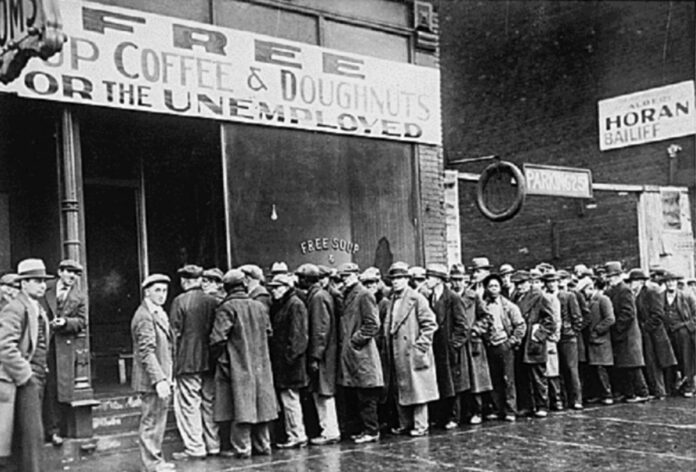That phrase, “consumers are pulling back on discretionary spending,” is a scary one for anyone in the know.
The latest report on consumer confidence from the Conference Board said, “The US economy is expected to continue to lose momentum near-term as high prices and elevated interest rates sap domestic demand.”
Add this together with the sudden drop in the market—followed by confusion, fear, and doubt—and a thinking person will read between the lines and come up with this warning: prepare for a recession.
What Recession Brings
What do we expect to see in a recession? It’s a vicious cycle. Let me recap what I have seen:
- As prices rise, consumer buy only things they need, like food and gas, limiting their spending on things they want, like vacations, new clothes, furniture, etc. (See our title)
- Other people grow concerned about the economy, so they pull back on their spending
- As a result, companies see their sales decline and profits drop
- Stock prices fall because they are based on future earnings
- The falling stock market makes wealthy people feel less wealthy, so they cut back on spending, exacerbating the problem
- To save money in an attempt to become profitable, companies pare back their staff via early retirement offers followed by layoffs
- R&D and capital expenditure budgets are cut, meaning fewer jobs and more layoffs
- Even healthy companies implement hiring freezes
- Retailers and restaurant chains stop opening new locations and close those that are not profitable
- Some businesses declare bankruptcy because they can no longer afford to pay their debts, resulting in more lost jobs
- Unemployment rises for multiple consecutive months, potentially doubling its present level
- People who have lost their jobs cannot find a new position because there are more candidates competing for fewer available jobs
- Newly unemployed people spend less, so companies become even less profitable
- Credit card delinquencies, already high, increase
- Because fewer people are employed, income tax receipts drop, so cities, counties and states start running deficits
- These municipalities cut back on services and lay off people
- Crime rises because desperate people sometimes turn to crime and because there are fewer police
- Cars get repossessed and houses go into foreclosure because people can’t make their payments
- Homelessness rises
- Adult children move in with their parents, resulting in more multi-generational homes
- Banks lose money as people default on car loans, mortgages, personal loans and credit card debt
- The financial system grows increasingly shaky and we see bank failures
Once we reach this stage, two things can happen: The economy can grow worse and we can go into a depression or the government can pump funds into the system, trying to jump start it.
A Depression
The country hasn’t had a depression for close to 100 years. Some would say we are due one. While we have all lived through a recession, very few alive today remember the start of the Great Depression in 1929.
Think of a depression is a recession on steroids; figure the list above gets worse by a factor of three. For example, instead of 8 or maybe 10 percent unemployment, it hits 25 percent. Instead of a few stores in a shopping center closing, half of them do. Churches can’t support themselves because the members who tithe no longer have an income. Healthy businesses and well-known brands and businesses go bankrupt.
100 years ago, a depression was bad. Today, it will be worse because of the fragility of our system. If over-the-road trucking companies close, goods can’t get to market. If farmers who can’t pay their bills have their equipment repossessed, or if they cannot afford grain or fertilizer, there won’t be enough food to go around.
In the 1920s, 30 percent of people lived on farms and could feed themselves (the dust bowl being an exception). Today, only two percent of the population live on farms.
The Government Response
Any government response will include pumping money into the system. The good news is the government will probably do this early enough to prevent a recession from becoming a depression. The bad news is it will cause even higher inflation than we saw after the COVID infusion of cash. Any way you look at it, creating money and injecting it into the pockets of people so they feel more confident is a short-term fix with long-term negative consequences. A recession is, by definition, deflationary. There is no way around the fact that curing a recession is inflationary.
In effect, a recession is the market is telling us it needs a reset. The government wants to avoid a reset because people get hurt, which makes it hard for politicians to get re-elected. Kicking the can down the road, a time-honored political practice, is growing less effective as the road gets steeper. Pretty soon, all those cans are going to roll back down and instead of a recession or a depression, we’ll have an economic collapse. Borrowing trillions of dollars to inject into the economy is a great way to speed up that collapse.
Layoffs
I worked for a large company during the dot-com bust. I remember going into the Chief Financial Officer’s office with my boss, a vice president, to show him our proposed budget. We were proud we had held the line and our budget remained $8 million. He told us we had to come back with a $6 million budget.
How do you save 25 percent without cutting jobs? We did it by eliminating our advertising budget. My guess is doing so hurt our sales, but that’s the choice we made because it saved jobs. I don’t think the CFO cared how we did it, only that we cut $2 million. Other departments laid people off, and the company put a hiring freeze into place.
Surviving a Recession
The best way to survive a recession (or a depression) is to stay employed. Getting laid off usually isn’t a choice, so if you can’t stay employed, then have a second (or third) way to make money. Side gigs and part-time jobs may not replace your salary, but they can help keep your head above water. Even in the worst recession, there will be wealthy people who need their dogs walked, their kids tutored, their estates patrolled and protected, and their cars driven or repaired. Whatever it takes, having an income stream is what will keep you afloat.
Avoiding debt is the second best way to survive a recession. If you don’t owe money on your car, they can’t repossess it. Any savings you have can help you keep afloat while you seek alternate employment. If you remain employed and you have savings, you can use it to snap things up when they are a good buy because people will be desperately selling them to raise money. This will add to your wealth after the recovery.
In 2008, I had granite countertops installed in our house for a fraction of what I would have had to pay two years prior when the housing market was booming. Housing starts had collapsed and there were contractors with warehouses full of granite begging for jobs.
If you have valuable items that you plan to sell during a recession, I would advise you to sell them now and bank the money. (This advice does not apply to gold, silver or bitcoin, which should have a liquid market.) In the middle of a recession, it will be tough to find a buyer for your expensive crossbow, your ski doo, or bass boat. Pawn shops will be flooded with tools, guns, guitars and similar items. Sell today and you will likely get more for your goods.
Be Cautious
I’ve been publishing articles predicting a recession for two years and we haven’t had one yet. That’s alright; I’ll be right, eventually. Whether that happens this year, next, or in another two years may depend on the election and whether we go to war.
Take advantage of the time between today and the recession to pay off debt, build your savings, make yourself indispensable at work, and line up a side gig. If there is no recession this year or next, great! If there is, you’ll be better prepared than many.
Please remember: I am not a financial advisor; I’m just a prepper and a student of history who has lived through prior recessions. Seek the advice of a financial professional and do your own research before making important financial decisions.







